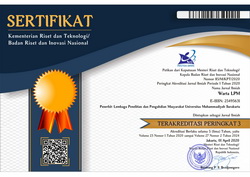Digital Storytelling Training for Senior High School English Teachers
DOI:
https://doi.org/10.23917/warta.v28i2.10554Keywords:
digital storytelling, english language teaching, professional development, technology integrationAbstract
This article reports on a community service program aimed at enhancing English teachers' creativity and digital literacy through the integration of digital storytelling. Conducted in collaboration with MGMP Sidoarjo, the program involved 51 senior high school English teachers who participated in a hands-on workshop using Canva to create digital storytelling materials aligned with their instructional goals. The study employed a mixed-methods approach, combining observation, surveys, and qualitative feedback to evaluate teacher engagement, product quality, and classroom implementation. Findings indicate a notable improvement in teachers' confidence and competence in utilizing digital tools, with all participants successfully producing at least one digital storytelling product. Although time constraints limited full implementation in some classrooms, student responses were overwhelmingly positive, citing increased motivation and engagement due to the visually rich content. Teachers also reflected positively on the training's impact, highlighting its practical value in modernizing English language instruction. The program underscores the importance of supporting teacher development through creative and technology-enhanced pedagogical strategies. It is recommended that schools foster a culture of innovation and that MGMP sustain the momentum through long-term mentoring and experimentation with varied digital learning media in response to evolving educational demands.
Downloads
References
Adipat, S., & Chotikapanich, R. (2022). Sustainable Development Goal 4: An Education Goal to Achieve Equitable Quality Education. Academic Journal of Interdisciplinary Studies, 11(6), 174. https://doi.org/10.36941/ajis-2022-0159
Agustina, S., Megawati, F., Taufiq, W., Setyowati, N. A., & Nurani, S. D. G. (2024). Optimizing English learning in high schools with contemporary learning models using whiteboard animation. Journal of Community Service and Empowerment, 5(3), 615–623. https://doi.org/10.22219/jcse.v5i3.35776
Cassar, C. (2022). Addressing Transformative Education and Governance Through the Sustainable Development Goal 4: A Case Study. Opportunities and Challenges in Sustainability, 1(2), 105–115. https://doi.org/10.56578/ocs010203
Desniyanti, D. (2025). The Role of Teachers in the Development of Digital Literacy. PPSDP International Journal of Education, 4(2), 538–552. https://doi.org/10.59175/pijed.v4i2.535
Dou, A., Huang, C., & Huang, X. (2024). Transformation of English Education in the Digital Era: A New Paradigm for Holistic Development. Education Insights, 1(1), 22–28. https://doi.org/10.70088/msw7vv92
Hafidurrahman, Moh. (2024). Innovation in English Language Teaching: The Implementation of Digital Technology in the Classroom. Indo-MathEdu Intellectuals Journal, 5(6), 7004–7016. https://doi.org/10.54373/imeij.v5i6.2042
Harahap, T. R., Nasution, B., Nasution, F., & Harahap, A. N. (2024). Digital Narratives: The Evolution of Storytelling Techniques in the Age of Social Media. International Journal of Educational Research Excellence (IJERE), 3(2), 738–745. https://doi.org/10.55299/ijere.v3i2.1004
Krishna, K. B. (2025). Digital Storytelling: An Innovative Approach to Teach and Learn English Language. In Digital Crossroads: Integrating Humanities, Science and Technology Edition 1 (pp. 251–262). BP International. https://doi.org/10.9734/bpi/mono/978-93-48859-10-5/CH24
Lakshmi, K. S. (2025). Digital Frontiers in Storytelling & Narrative Revolution. In Digital Crossroads: Integrating Humanities, Science and Technology Edition 1 (pp. 263–270). BP International. https://doi.org/10.9734/bpi/mono/978-93-48859-10-5/CH25
Rajendran, V., & Md Yunus, M. (2021). Interactive Learning via Digital Storytelling in Teaching and Learning. International Journal of Education and Literacy Studies, 9(3), 78. https://doi.org/10.7575/aiac.ijels.v.9n.3p.78
Saud, D. S. (2024). Teacher Educators’ Experiences of Integrating Digital Technologies in English Language Teaching. KMC Journal, 6(2), 106–127. https://doi.org/10.3126/kmcj.v6i2.68893
Sinta, D., Faqihuddin, A., Nurhuda, A., & Ab Rahman, E. S. B. E. (2024). The Role of Digital Media in Optimizing Project-Based Learning to Practice 21st Century Skills. Educative: Jurnal Ilmiah Pendidikan, 2(3), 129–138. https://doi.org/10.70437/educative.v2i3.477
Wahab, G., & Adawiyah, S. R. (2025). Application of the Blended Learning Approach in Developing Student Character in the Digital Era of the 21st Century. The Journal of Academic Science, 2(1), 84–94. https://doi.org/10.59613/89hahs97
Wuthnow, J. (2023). Multimodal literacies and critical reflexivity: Digital storytelling as a 21st century tool for Learning Developers. Journal of University Teaching and Learning Practice, 20(4). https://doi.org/10.53761/1.20.4.02
Yuniarti, Y., Yulian, R., & Yuniarti, Y. (2022). Digital Story Telling Based on Multimodal Elements on EFL Learners’ Speaking Performance. JPI (Jurnal Pendidikan Indonesia), 11(2), 308–316. https://doi.org/10.23887/jpiundiksha.v11i2.40217
Zinchenko, V., Levkulych, V., Palamarchuk, O., & Debych, M. (2021). Global cooperation of research and educational activities in the implementation of the Sustainable Development Goals. E3S Web of Conferences, 277, 02005. https://doi.org/10.1051/e3sconf/202127702005
Downloads
Submitted
Accepted
Published
How to Cite
Issue
Section
License
Copyright (c) 2025 Warta LPM

This work is licensed under a Creative Commons Attribution 4.0 International License.














